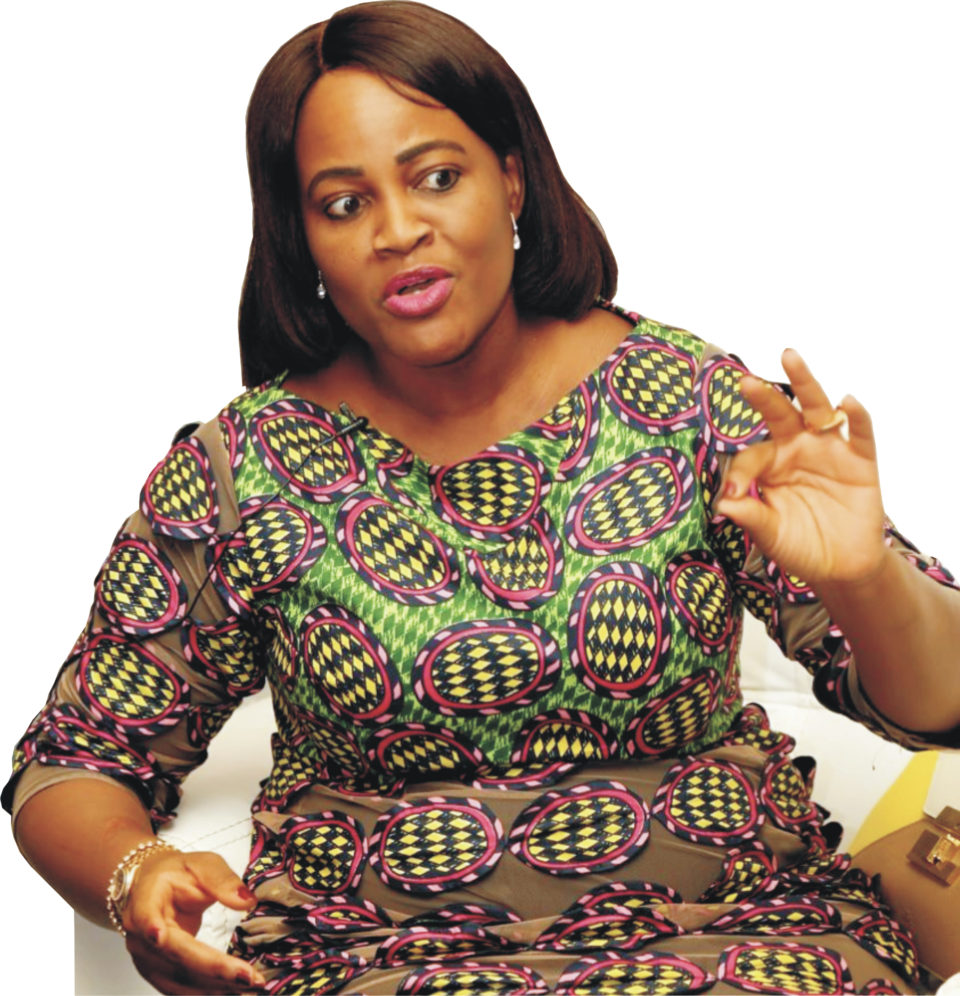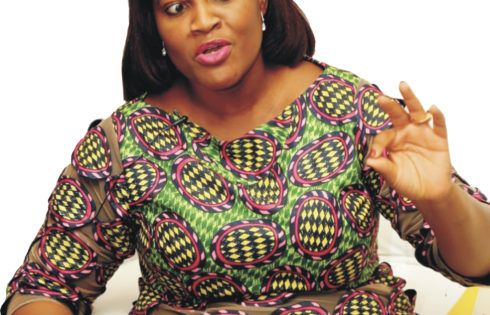
 Mrs. Chinelo Anohu-Amazu, the Director General of National Pension Commission (PenCom), the main driver of the Pension regulation in Nigeria does not need any introduction. Economic Confidential, Nigeria’s Economic Intelligence Magazine caught up with her at the just concluded World Pension Summit, ‘Africa Special’ in Abuja where she opened up on the commission’s very ambitious project of increasing pension coverage to the informal sector which she tagged a revolution. Her enthusiasm about the brand new project called ‘micro-pension’ and other areas of investment are here captured by our Managing Editor, Ewache Ajefu. Excerpts:
Mrs. Chinelo Anohu-Amazu, the Director General of National Pension Commission (PenCom), the main driver of the Pension regulation in Nigeria does not need any introduction. Economic Confidential, Nigeria’s Economic Intelligence Magazine caught up with her at the just concluded World Pension Summit, ‘Africa Special’ in Abuja where she opened up on the commission’s very ambitious project of increasing pension coverage to the informal sector which she tagged a revolution. Her enthusiasm about the brand new project called ‘micro-pension’ and other areas of investment are here captured by our Managing Editor, Ewache Ajefu. Excerpts:
We understand that this summit may likely introduce innovation into our existing framework in pension fund administration. What is your position on this?
This is one of things we are very kin about. And that is providing a platform for dialogue and not just in Nigeria but across the entire continent and because of our peculiarities and similarities. And so we need to harness all these together and that is why we are sitting under one roof having diverse ideas as they can be adoptable and adaptable. That is why we are talking and in that talking something innovative would arise in order for us to move in the direction we want. And like former President Olusegun Obasanjo said at the event we need to innovate and that innovation will definitely be with caution because of the peculiar nature of the pension fund which are here to meet liabilities whenever they crystallize. And that is a key point.
Despite the challenging economic situation in Nigeria, and indeed all of Africa and globally, what we are doing is how positioned are you? And that is what makes a difference between a winner and a loser. And like the case of Nigeria, we are very optimistic. Once the recession is fixed, what I call the challenging times because as it is, Nigeria has been a mono-product economy. But what this will do later on is to unleash that entrepreneurial spirit. All of a sudden, that dependence on oil which has been the bane would not arise anymore. What you will see is huge potential, that indomitable spirit, not just in Nigeria but the whole of Africa and people are going crazy with that entrepreneurial ability to conquer. And that is why for those of us in the Pension sector believe that the era of salaried income would be over paving way for micro-pension initiative, not interpreted as for low income earner, No. They are also part of it. But the larger ones are new entrepreneurs and artisans and a whole gamut of it. We are talking about at least 32m people who are actually working but because it’s informal employment they are out of the pension system. We are talking about someone who can make money using only a mobile phone and other forms of technology. It is Just like Mr. Mark Zucherberg the owner of Face-book who is worth $58 billion, who walked into Nigeria recently with a pair of Jeans and T-shirt! That is the future of pension in Nigeria. We have been forced as a Commission to think outside the box that the future of pension is changing and we have to be part of that dynamics, changing towards the entrepreneurs, who necessarily need retirement cover when they are no longer able to work. And that itself has a totally different set of rules and different type of access to the fund and different set of contribution rates. This is because the funds may not come regularly every month.
What the lady that performed and thrilled delegates at the event would charge for that concert alone will definitely be more than a yearly salary of a Pencom staff. It is possible. This is because she may not be called tomorrow.
How much does Africa require annually to bridge the infrastructure deficit and how do you intend to achieve that?
Well bridging Africa’s infrastructure deficit will require sustained spending of about US$93 billion per annum, which translates to about 15% of Africa’s GDP. This huge challenge can be surmounted by a coordinated, multifaceted approach to development and the integration of domestic funding sources such as pension funds, and foreign institutional investors.
There is a clear intention for everyone to close that gap and there is the obvious need to close the gap. At the last panel, there was a discussion on dynamics of pension investment and we are trying to see how we can leverage on domestic financing to close that infrastructure gap. And that is why the case of Nigeria is different. We are moving from a case of huge deficit to a huge asset base and from 0-100. Now what we are doing is to make it work more impact fully for both the contributors and the retirees.
If you see the demographics today, you notice that the continent has more of the youth population than ever before. And it is quite interesting that during the panel discussions a lot of focus was on Africa and how to develop products to meet the yearnings of our people and as well take into consideration the nuances and challenges of our environment. We have challenges in the political terrain and that of infrastructure. There is lot going on in the summit in order to de-risk any investment vehicle that would be made in the pension arena. Once the returns are not tampered with, a lot of people will invest.
Are there going to be new laws or regulations to allow these positions work?
Not at all! We have a robust legal and regulatory framework to take care of these new positions as you called them. That was what happened in the reform of 2014. On the reform of 2004, by 2007 we started realizing flaws inherent in the enabling Act, but we decided to let it run so we can see a whole gamut of what the issues are with the implementation of the 2004 laws and that culminated in the reform of the 2014, to bring in enhanced focus on infrastructure namely, housing and others. These innovations have won us the Corporate Governance Awards and that of housing. Remember that the 2004 laws would not allow anyone to borrow against their retirement benefits. That one in itself is a problem, because the average worker will need to have a roof over his or her head after retirement. We did the amendment to allow the utilization and borrowing against their retirement benefits. And now that it has happened, we are now talking a lot more with the mortgage institutions and fashioning out regulations. And don’t forget that the regulations will work because they derive their origin and power from the law. And the Pension Commission has been given the powers to access the environment and issue out regulations as the case may be. So in terms of investment regulatory and legal space, what we have is enough and we will adapt it to instances we are having now.
Has the Micro Pensions initiative started?
It’s already ongoing. May be what you are asking now is the launch of it. I am trying to remove people thinking that the launch of an event or product is the start of it. No. It starts from the consultations, research and engagements with relevant people. The successes we have in our activities are that we engage the stakeholders on regulations, such that the moment we start anything, the buy-in is no longer a problem and compliance is easier.
Since you are talking about innovations, what do you envisage to be the challenges?
The challenges are what we are dealing with as a summit, namely sensitization. People fight what they do not understand! Just to let you know that 90 percent of engagements we have especially people having misgivings in the process were dealt with and dismissed under one hour of meeting such oppositions. There was hue and cry in January this year after the end of our retreat where we spoke extensively on using pension assets for infrastructure developments. So when we sat in a room and asked whether any of them had time to look at the regulations? There is no cause for alarm. The nature of the Pension fund as a ring-fencing does not let itself into arbitrary dispensation of the fund as it must go through a channel. And that channel is through corporate bonds, be it in infrastructure or whatever. That bond must be list on the stock Exchange. Once the pension fund is going to be involved in this process, they raise the stakes in corporate governance and that is one of the biggest unspoken impacts of the pension fund.
